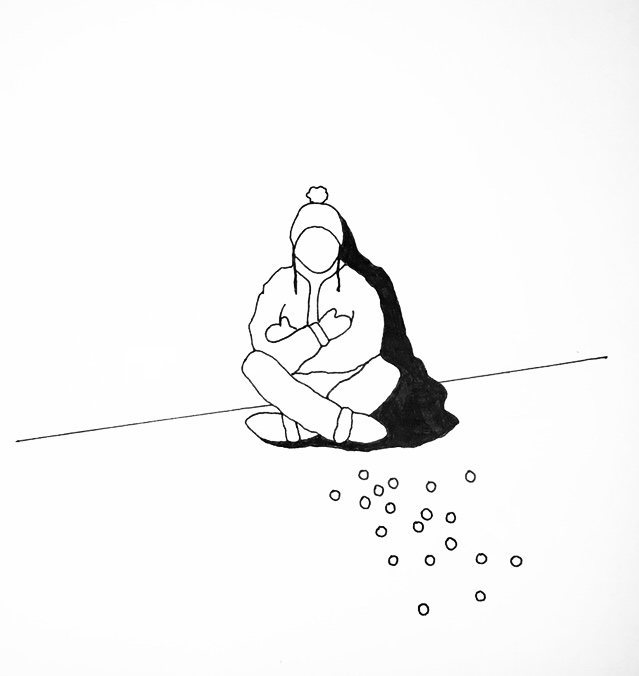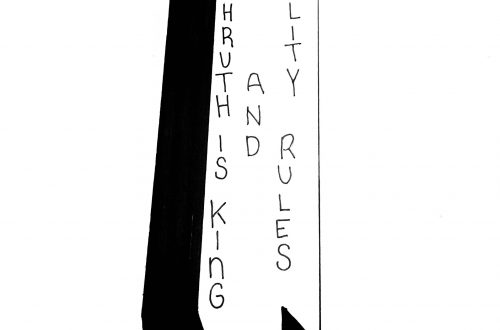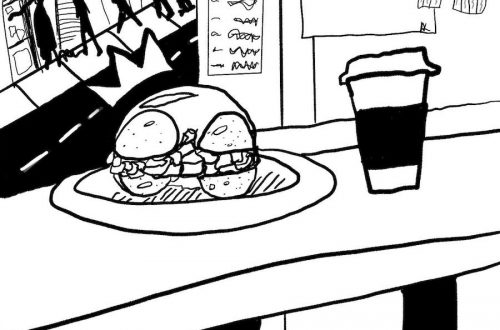by Heather Newton
Art by Corinne Pease
Heather’s essay, “Table Manners,” appears in episode 8 of The Dirty Spoon Radio Hour, which aired on December 7, 2018.
When I was a child growing up in Raleigh, North Carolina, my family had a tradition of inviting one or two friends to join us for dinner at the Plantation Inn every Christmas season. The Plantation Inn was a fancy restaurant attached to a less fancy motel. It had never been part of an actual plantation but it looked very Old South–all white with antebellum columns. Inside, the carpet was lush and red and candy canes hung from the chandeliers. A lady in an evening gown played Christmas carols on an electric organ in the corner. To my child eyes the Plantation Inn epitomized elegance.
To understand the significance of this annual event you must know that with four children and not much discretionary income, my family almost never went out to eat. When we did, we went to IHOP, or if Burger King had Whoppers on sale for a quarter my dad might spring for a bag. Otherwise, we ate at home. The local paper even did a full-page feature on my mother in which she proudly gave tips about how to feed a family of six on twenty-five dollars a week.
My parents’ intent in starting the Plantation Inn tradition was to honor the friends we took as guests, and to teach us children how to behave in public. Going to the Plantation Inn was a big deal. We dressed up. We hung our coats in a cloak closet as we entered. The tables were set with something called “cloth napkins.” Our parents expected us to chew with our mouths closed, refrain from licking our plates and, for one sweet evening, stop hitting each other.
Their efforts to turn us into ladies and gentlemen succeeded during the meal, but always fell apart when it was time to leave because of one thing–the mint bowl.
Their efforts to turn us into ladies and gentlemen succeeded during the meal, but always fell apart when it was time to leave because of one thing–the mint bowl. On a coffee table in the lobby sat an oblong silver serving dish full of butter mints. The idea, of course, was for patrons to take one mint to cleanse their palates after dinner. Because my mother’s food budget didn’t allow for candy at home, however, my siblings and I had no self-control whatsoever when we encountered candy elsewhere. Every year we stuffed handfuls of mints into our mouths and our linty pockets, completely cleaning out the bowl.
One fateful year as my dad was settling the check, another little girl sat on the couch in the lobby, surreptitiously raiding the mint bowl. As we watched, she reached out and somehow hit one end of the candy dish, flipping it high in the air. Pastel-colored mints rained down and the dish landed upside-down on the floor. Oh, the humanity. The hostess rushed over and swept all the mints into the trash. My siblings and I lingered as long as we could by the cloak closet hoping the hostess would refill the bowl, but she never did. As long as we live we will never forgive that clumsy little girl.
The guests we invited to the Plantation Inn included close family friends and people my parents wanted to know better. A few were couples but most were single. They were teachers, writers, a minister, a wood carver. My favorite was a young man who had served as a missionary in Kenya. He spoke a made-up language called “Alfalfa” (similar to Pig Latin, only funnier). When he told a story in Alfalfa my normally reserved father laughed so hard tears spurted from his eyes. The trait all our guests shared was that they were interesting and willing to engage with grownups and children alike. They entertained me and they listened to me.
In his book Confederates in the Attic, Tony Horwitz describes the Plantation Inn as “a faux plantation motel on a busy suburban road, right across from Kmart” where a group “designed to prepare youngsters for Confederate citizenship” had decided to have its annual meeting. For me, despite its politically incorrect name, the Plantation Inn was not a nostalgic symbol of the fallen South. I remember how warm and cozy it always was, the savory smells that rose from silver chafing dishes on the buffet line, the strong hands of the man who carved the roast beef, his uniform and chef’s hat as crisp and white as the snow we never got for Christmas in North Carolina. And I remember the lessons I learned there: Treasure your friends, old and new. Show them you value them. Enjoy them.
Custom artwork by Corinne Pease







